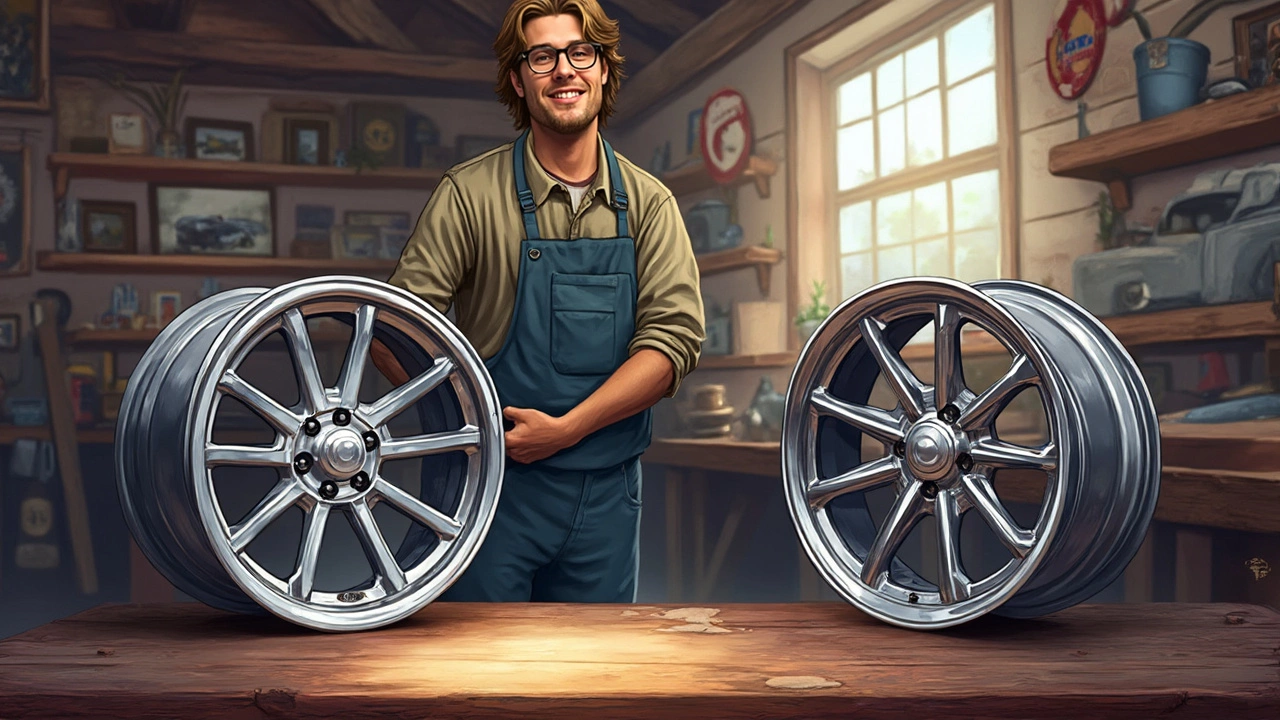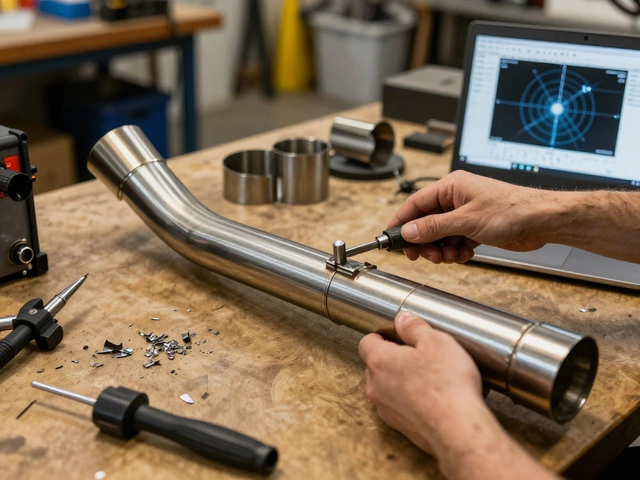When it comes to choosing wheels for your car, it often boils down to two options: alloy wheels or normal wheels. Now, you might be scratching your head, wondering what's the big deal, right? Well, here’s the scoop: the right set of wheels can make a huge difference in performance, fuel efficiency, and even the overall look of your ride.
So, let's kick things off with a quick breakdown. Alloy wheels are made from a blend of metals, usually aluminum or magnesium, which makes them lighter than their steel counterparts (a.k.a normal wheels). This reduced weight can enhance several aspects of your vehicle's performance, including quicker acceleration and better fuel consumption. Plus, they just look plain cool, bringing a bit of stylish flair to any car.
- Understanding Alloy Wheels
- The Case for Normal Wheels
- Comparing Cost and Maintenance
- Choosing What's Right for You
Understanding Alloy Wheels
Alright, let's dive into what makes alloy wheels tick. These wheels are crafted from a mixture of metals, with aluminum being the star player most of the time. This combination gives them a lightweight nature, which is one of their biggest selling points. We're talking about less rotational mass, meaning your car can accelerate faster and handle better on the road.
Alloy wheels are superstars when it comes to performance. Due to their lower weight, they heat up less quickly than steel wheels. That means better braking performance and reduced wear and tear on your car’s suspension. A lot of folks love them for their designs too. Unlike boring steel wheels, alloys offer a range of styles and finishes, from glossy paint to chic polished looks.
Durability and Maintenance
One thing you must know is that while alloy wheels are robust, they're also a bit more vulnerable to physical damage. If you find yourself bumping curbs a lot, there's a higher chance they'll get bent or cracked compared to steel options. Thankfully, advancements in technology have made alloys more durable than ever before.
Maintenance is another factor. You'll need to give them a bit more TLC to avoid corrosion, especially if you live in coastal areas or places where roads get salted a lot in winter. Regular cleaning and applying a coat of wax can keep them shiny and in good condition.
Value Proposition
| Feature | Benefit |
|---|---|
| Weight | Less strain on suspension |
| Heat Dissipation | Better braking efficiency |
| Design | Enhanced car appearance |
| Corrosion Resistance | Long-lasting under normal conditions |
So, are they worth it? If performance and style are high on your car-priority list, then alloy wheels could be the way to go. They're a bit pricier than normal wheels but offer value in terms of aesthetics and performance.
The Case for Normal Wheels
Okay, so normal wheels, often called steel wheels, might not win any beauty contests, but they’ve got their own set of perks. Let's first talk about the number one reason folks go for these: durability. Made from steel, these wheels are tough, way less likely to crack compared to alloy wheels. No need to worry much about potholes or curbs ruining your day—they can take a punch.
Another huge plus? They're easy on the wallet. When you’re watching your budget, normal wheels are generally more affordable than their alloy counterparts. They’re a smart choice when you need reliability without shelling out a ton of cash. Plus, the cost of repairs is usually lower too, since steel is easier to fix than the materials used in alloy wheels.
Low Maintenance
Here’s something that might surprise you: when it comes to maintenance, normal wheels are pretty low-maintenance heroes. They can endure rough conditions and still come out looking, well, like they did before. Less corrosion is one perk they bring to the table, especially suited if you're in an area with salty roads in winters.
Weight Considerations
Of course, they do have a downside—they’re heavier, and that means they could affect your fuel efficiency a bit compared to alloy wheels. But if you’re mostly driving around town and not worried about shaving down your 0 to 60 times, this might be a trade-off you’re willing to make.
Overall, normal wheels make sense for a lot of drivers. They're solid, dependable, and kind to your budget. Sure, they might not have the flashiest look, but they’ll get you from A to B without a hitch.

Comparing Cost and Maintenance
When thinking about alloy wheels versus normal wheels, you can't ignore the cost and maintenance aspects. These factors can hugely influence your decision, especially if you're keeping an eye on the budget.
Cost Factor
First things first, let's talk about the price tag. Typically, alloy wheels are more expensive than steel or normal wheels. The alloy wheels' sleek designs and material cost make them a bit pricier. If you're going for a full vehicle set, this can add up quickly. But here's the upside—many argue that the perks you get from alloy wheels like performance boosts might just be worth the extra bucks.
Maintenance Matters
Now, how about keeping those wheels in top shape? Alloy wheels need a bit more of your attention. They can get damaged more easily because their lighter material is more prone to bending or cracking if you hit a big pothole. Plus, if you're living in areas with lots of salty roads or moisture, watch out for corrosion. But don’t worry—some regular cleaning and proper care can keep them looking fantastic.
On the other hand, steel wheels—or normal wheels—are known for being low-maintenance champs. They can take more of a beating when it comes to bumps and rough roads. Plus, if they do end up getting damaged, repairs or replacements won't hit your wallet as hard.
Investment in Value
If you're thinking long-term, alloy wheels might retain more value over time, potentially helping with resale value. That said, if you want hassle-free and budget-friendly, normal wheels are not a bad pick at all.
Here's a quick comparison of estimated costs to give you a clearer picture:
| Type | Average Cost (per wheel) |
|---|---|
| Alloy Wheels | $150 - $400 |
| Normal Wheels (Steel) | $50 - $150 |
Choosing What's Right for You
Picking between alloy wheels and normal wheels might seem daunting, but it really boils down to what you need and value in your car. No one-size-fits-all answer here. So, let’s look at a few things to consider.
Performance and Style
If you're looking to boost your car's looks and get a bit more zing in terms of performance, alloy wheels are your best bet. Because they're lighter, they help with quicker acceleration and better handling. Plus, alloys often come in a wider variety of designs, so if style points matter, these are a solid choice.
Budget and Durability
For those on a budget or those who drive on rough terrain a lot, normal wheels (steel wheels, to be precise) usually win the durability battle. They can take more kicks from potholes and bumps without bending. Also, their initial cost is less, and replacement won't break the bank.
| Wheel Type | Pros | Cons |
|---|---|---|
| Alloy Wheels | Lightweight, Stylish, Better Performance | Can be Pricey, Less Durable |
| Normal Wheels | Durable, More Affordable | Heavier, Less Stylish |
Climate Considerations
Live in an area with rough winters? Steel wheels might be more practical since they’re usually tougher in harsh conditions. But, if ice and snow aren't an issue, alloy wheels can offer more than enough resilience for everyday driving.
At the end of the day, your choice depends on what aligns best with your lifestyle and driving habits. Think about what matters most to you—looks, cost, or durability—and that’ll guide you toward the right decision.






